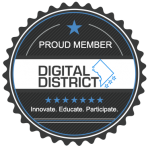What we can learn from KitchenAid, and should Social Media Managers maintain personal accounts?
We all know what happened during the first presidential debate. Big Bird got dissed and a social media manager at KitchenAid committed the social media career Avada Kedavra: they inadvertently Tweeted content intended for their personal account to the account they manage professionally.
The Tweet () appeared as Obama reminisced about his grandmother, who died days before the President was elected in 2008. The social media manager or another member of the social media team immediately recognized the error, and the Tweet was quickly deleted… but, as underscored again, and again, and again, THE INTERNET NEVER FORGETS.
The KitchenAid public relations team, lead by marketing executive Cynthia Soledad, moved quickly to respond to the situation, issuing apologies via Twitter and Facebook for the offensive Tweet. They also noted in the LA Times that the errant Twitter team member, “needless to say, won’t be Tweeting for us anymore.” And, “Soledad said in a separate statement that the employee meant to post the Tweet on a personal account but mistakenly sent it instead through the corporate account.”
Well, duh. As if anyone thought the employee did it on purpose. No one has that kind of Vendetta against KitchenAid. If your cookies didn’t turn out, it’s probably your fault, not your $400 mixer’s.
The LA Times writes, “the PR disaster shows the risks that companies take in using social media to leverage their brands,” and that “KitchenAid isn’t the first company to commit a high-profile social media gaffe.”
We know this. In fact, I’m going to go out on a limb and say any social media manager worth their salt learned not to connect your professional and personal accounts under the same management platform back in February 2011 with the Red Cross’ infamous “#gettngslizzerd” incident.
This should be a requirement for all community managers: If you manage a social media account professionally, whether it has 300 followers or 300,000 followers, content should be coming from completely different management platforms. As in, open another app, open another window. Don’t just hope you’ll remember to switch accounts in a single instance of Tweetdeck or Hootsuite. You won’t. I know because it happened to me—I thought convenience outweighed the risk. I used to manage SMCDC’s account from the same Tweetdeck I managed my personal account from… I thought, “oh, I’ll be careful, it won’t happen to me” … and then I messed up. Not in a huge, embarrassing gaffe (I’d like to think I have the grace and class to not Tweet things like the examples above), but I inadvertently made a mistake and had to quickly pull it or own it. (I wanted to ask my followers what they thought of an item on Fab and instead asked all of SMCDC’s.) It’s was embarrassing, even though I’m fairly certain only one person (another SMCDC digital team member who, like me, sits glued to his feeds all day) saw the errant Tweet. Regardless, though it was not in poor taste, the Tweet was not directly related to the group, our messaging, or the overarching SMC brand and thus inappropriate. Again, not really reputation-breaking, but pretty amateur and entirely preventable.
I’m not here to preach to the choir, though…
(SEPARATE MANAGEMENT PLATFORMS!!!)
What really got me thinking, and the reason for this post, was actually not the incident itself. Instead, it was a comment by , one of the first on Mashable’s coverage:
: “shows the bad usability of Twitter’s mobile app. If you open a notification to a mention you are dropped into that account. The question is should someone handling social media for a company keep a private personal account?”
While Twitter’s mobile usability is a separate issue, I was really curious to hear what people thought about Andrew’s question, so we asked our audience from the SMCDC account:
Should someone handling social media for a company keep a personal account?
Our followers pretty unanimously agreed that the problem could be avoided by being diligent about keeping separate management platforms.
@ @ I keep separate phones, much less separate apps
— Andy Le ()
@ @ separate accounts always, private accounts never
— kimchiquita ()
@ @ @ social media is transparent and those who manage it should equally be a part of the public conversation
— kimchiquita ()
@ I think it’s better for your pro account if you DO have a personal one. (How much work stuff do I test on my profiles first?!)
— Lacy Baugher ()
I think ’s last point is particularly interesting. I can say with certainty that a lot of the things I’ve learned about social media, especially Twitter, have come from personal, not professional use. Learning how to use hashtags, listen (and then engage), research, and communicate in this space has come largely from experimenting in my free time. I’ve been able to apply and modify some of the things I’ve learned to inform strategies for accounts I’ve managed professionally. I don’t think I’d ever want to give up personal social media use for a job. I can see why community/social media managers in some positions (government, education, military, etc.) might be required to privatize their accounts, but I think even in those cases, many industries lean towards simply requiring a disclaimer (First Amendment rights and all).
Recently, though, I’ve met some community and social media managers who say they don’t, in fact, use social media in regularly their personal lives. They say they can’t manage to find time to Tweet regularly, or don’t know what to talk about. This strikes me as odd. I’m a digital media strategist for a living because I love it. I use social media in my personal life because I love it. Luckily, these have proven, for the most part, to be mutually beneficial practices.
“Choose a job you love, and you will never have to work a day in your life.”
Good advice, Confucius.
I wonder, though…
Do you think has a point in thinking people who manage social media accounts professionally should step away from their personal accounts?
Do errors like the one made by KitchenAid USA occur because the social media manager was too comfortable engaging regularly both personally and professionally around the clock and had the kind of momentary lapse in judgment that may come more easily to people who aren’t ALWAYS carefully crafting, analyzing, and receiving approval for every content item?
Have you ever met social media managers (or similar digital folks) who don’t use social media in their personal lives? Do you think it’s weird?
Let us know what you think in the comments!


October 8, 2012
Terrific post, Sarah.
I don’t have much to add except for offering the opinion that the people who are best at managing an organization’s social media are generally the same people who are best at managing their own personal social media. Some people are just “good” at this – at least in terms of frequency of use and having already somehow integrated their brains and lifestyles along with the networks where they publish content. I feel like when I’m hired out as a consultant (mostly in the arts sector), an organization is in a way buying real estate inside my brain – I’m ALREADY sending these messages out and engaging in conversations related to topics the organizations care about (because I DO honestly care about these things, which I know isn’t always the case), and if they pay me to work on their behalf, they get to piggyback on that passion and expertise. Of course there’s a heavy amount of content which comes directly from them (advertising events, etc.) as well – but even given that they’re still paying a specialist who knows how to morph that stuff into a “Tweetable” format. This is Reason #164246 why it’s not sufficient to simply “get the youngest employee to set up a Twitter feed,” because if that employee doesn’t have any idea how to USE Twitter, there’s no benefit to the organization. I observe this happening a lot in the arts world – the problem is of course that there’s an organizational lack of awareness about what social media “is” and what it “does.” Which is PRECISELY where groups like SMC-DC come in, right?
All food for thought. Nice to know that Twitter “officially” asks us to capitalize “Tweet,” too!
October 8, 2012
I feel like people who work in social media do so because they love social media. Asking an employee who manages social media not to use it at all in their personal lives is similar to asking someone who works in sports not to play touch football with their friends. Yes, I know it’s much more public, but good employees should know how to manage it. I also think companies should have policies in place to minimize the chance of slip-ups like this. That’s my two cents, at least.
October 8, 2012
Excellent post. I know people who are responsible for branded social profiles who don’t actually use these platforms for personal use. While I understand the genesis of the question, don’t Tweet (Capital T!) for personal use and you will never make a mistake, I find that folks who aren’t immersed in social often miss very simple concepts that become very important to brands. Things like fostering real engagement and capitalizing on timely stories versus scheduling out push messages weeks in advance.
I think your advice to keep separate apps is sound. I will admit that I lump them all together because I am lazy, but you’ve now prompted me to download another app for personal use. Personally, I would never hire a junior social media manager who didn’t use social media. Even with the risks, because I agree with Lacy.. you need to test and experiment in your own space, not in the brand’s.
October 9, 2012
I have to say the KithenAid gaffe gave me chills. That so could have been me! While I generally try not to tweet stuff that would count against me if I ever ran for president, when you mix the monitoring of your personal and professional accounts, mistakes happen. Just prior to this incident I separated the management of my professional and personal accounts, and after this example, I wont be recombining them. Yes, its not convenient, but there are upsides. For one, I no longer break into a cold sweat wondering what account will I just sent the picture with a cat in a stroller to.
I strongly think that people who manage brand social media should continue to develop their personal online presence. That’s the place where learning takes place, and it helps expose you to how other people and brands are doing to the very things that you want to accomplish.
October 10, 2012
Separate platforms is the way to go. Testing is key, and I would highly recommend testing in your own personal (private) account first. Great article.